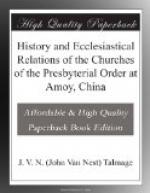This incipient Classis met next in the autumn of the same year at Peh-chui-ia, a church under the care of the English Presbyterian brethren. At this meeting it became a real Classis, not fully developed as a Classis in a mature Church, but possessing the constituent elements and performing the functions of a Classis. Not only were there cases of discipline to act on, but a distinct application was made by one of the churches, that a pastor be ordained, and placed over them. The body decided, not only that they had the right, but that the plain call of the Great Head of the Church made it their duty to go forward in this matter. Preliminary steps were taken, other meetings of Classis were appointed and held, candidates were examined, calls presented and approved, until early in the present year the First and Second Churches at Amoy had each a native pastor ordained and installed over them. By the authority of this Classis, in the early part of this year, a third church was organized at Amoy according to our order. It is in the suburb called E-mng-kang, and is under the especial care of the English Presbyterian brethren, as mentioned in a previous part of this paper. So now there are six organized churches, all of the same order, and some others almost ready to be organized. If the Missionaries at Amoy have been guilty of any great mistake, it has been in this matter of forming such a Classis, and proceeding to the ordination and installation of native pastors, and the organization of new churches. Therefore, this subject demands a careful examination.
When we commenced the work among the heathen, it was found that the Constitution of our Church had made no provision for such work beyond the simple ordaining of men as Missionaries. We might preach the gospel, but no provision was made for receiving into church fellowship, administering the sacraments, electing and ordaining office-bearers, and all the incipient steps of the organization of the Church from among the heathen. The Constitution was made for the government of a Church already organized and matured, and in America; therefore, it is not strange that such things were not provided for. Our duty seemed very plain. We must fall back on the great principles of church government taught in the Word of God. We believed these principles to be set forth in the Constitution, and other standards of our Church.
When, through the instrumentality of the preached Word, men gave satisfactory evidence that they had experienced “the renewing of the Holy Ghost,” without the advice of Consistories, by virtue of our office of Ministers of the Word, we administered to them the sacrament of baptism, thus admitting them into the church. Now the Lord’s Supper must be administered to these believers, baptism to their infant children, and to new converts, and the discipline of God’s house maintained. By virtue of that same office, and by virtue of the authority given by the Master to his Church, we felt that we had the right, aye, that it was our bounden duty, to perform such acts. We could not yet for a long time set apart a proper Consistory, but we must not therefore be “lords over God’s heritage.” In receiving new members, and in all acts of discipline, we must advise with the church already gathered.




